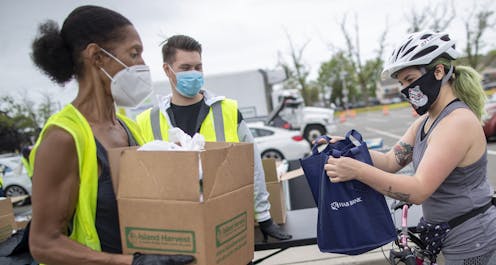National survey shows that social service nonprofits are trying to help more people on smaller budgets as the coronavirus pandemic and economic downturn unfold
- Written by Mirae Kim, Assistant Professor of Public Administration, Georgia State University

The Research Brief[1] is a short take about interesting academic work.
The big idea
A recent national survey we conducted shows that social service nonprofits[2] are estimating on average that over the next six months, their revenue will decline by between 19.3% and 37.3%.
They are already reacting by cutting staff and some of the services they provide: 69% of nonprofits have already had to cut their programs, while 39% have seen demands for their services grow.
The responses we collected from these nonprofit leaders suggest that during the initial weeks of widespread social distancing brought about to slow the spread of the coronavirus, most nonprofits dramatically shifted their staffing, programs and plans for the future.
And they were already bracing for even more challenging times.
Why it matters
About 110,000 charitable organizations provide social services[3], ranging from assisting with housing and food to operating job training and child care centers. These groups also help communities respond and recover from disasters.
During recessions[4], demand for their services tends to rise while their revenue falls, making it harder to meet urgent needs.
How we did this work
Once the COVID-19 pandemic forced businesses, schools and countless other venues to close their doors, leaving the economy reeling[5], we wanted[6] to see how the downturn was affecting different kinds of nonprofits[7].
We sent nonprofit leaders across the country a short survey to learn about what they are going through. About 400 social service groups responded between April 20 and May 8 – including organizations based in all 50 states.
As data starts to trickle in, others have also found similar results. In San Diego[8], for example, 71% of nonprofits had scaled back some of their services. In Nebraska[9], nonprofit leaders say that the crisis is hitting them hard. In Ohio[10], 15% of nonprofits have already furloughed staff. And in Florida[11], 73% of nonprofits have seen a disruption in services.
What’s next
Many nonprofits have obtained some financial relief from the federal government through the relief packages[12] Congress has approved so far[13]. But early indications are that larger organizations were three times more likely[14] to receive a Paycheck Protection Program loan than smaller community-based groups, leaving unmet gaps in community services.
Without an infusion of additional federal support, perhaps as part of an initiative many local officials have called for[15], we expect many social service nonprofits to continue to struggle to meet the needs of the communities they serve[16].
[You’re smart and curious about the world. So are The Conversation’s authors and editors. You can get our highlights each weekend[17].]
References
- ^ Research Brief (theconversation.com)
- ^ social service nonprofits (norpanel.org)
- ^ social services (nccs.urban.org)
- ^ During recessions (learn.guidestar.org)
- ^ economy reeling (www.marketwatch.com)
- ^ we wanted (scholar.google.com)
- ^ nonprofits (scholar.google.com)
- ^ San Diego (digital.sandiego.edu)
- ^ Nebraska (doi.org)
- ^ Ohio (www.philanthropyohio.org)
- ^ Florida (flnonprofits.org)
- ^ relief packages (www.thenonprofittimes.com)
- ^ Congress has approved so far (nff.org)
- ^ larger organizations were three times more likely (digital.sandiego.edu)
- ^ many local officials have called for (slate.com)
- ^ struggle to meet the needs of the communities they serve (www.globenewswire.com)
- ^ You can get our highlights each weekend (theconversation.com)
Authors: Mirae Kim, Assistant Professor of Public Administration, Georgia State University

